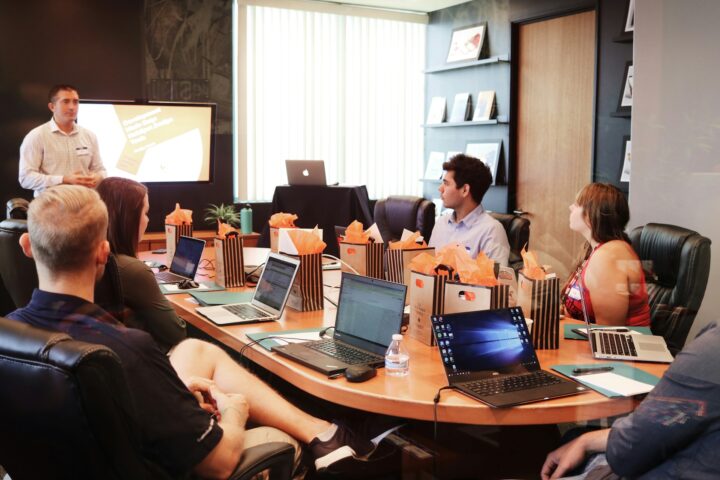Back when the first WeWork opened in SoHo, Manhattan in 2010, it helped revolutionize the workspace for nine to five employees. Not only did the flexible, trendy co-working space help freelancers spearhead their careers, but the innovative offices also welcomed larger companies.
Features like on-tap refreshments, lounging areas, and networking events transformed how employees and employers alike saw the workspace. Was it merely a location to fulfill an endless string of tasks, or could the space itself be harnessed to optimize the workplace and make it more efficient?
The debate is still raging in many fields, but one thing is clear: coworking spaces have transformed expectations of office life and efficiency. One study from Coworking Resources indicates that up to five million people will be utilizing a shared office space by 2024, indicating the trend is here to stay.
Traditional companies that have moved into such spaces are in a prime position to update standard practices. Looking to increase productivity in a shared working space? Let’s take a look at five unique ways to boost efficiency in the office.
Jam Out
A study from Psychology of Music showed that music helped boost efficiency when played in-between tasks. In fact, music is used by a range of professionals in order to boost mental functioning, especially in work that demands high levels of concentration.
The industries that can benefit from playing music in workplaces include manufacturing facilities or factories and creative industries. Workers tend to feel less tired with the soothing sound of music that can uplift their mood and energy. Hence, great music with the appropriate beat can improve productivity.
For example, poker pros rely on curated playlists to stay in the flow during long stretches of play. Today, it seems many prefer soundtracks that are instrumental and minimal so as not to distract from gameplay—but the idea of harnessing music has been around for a while.
Back in the days of the Wild West, many poker halls had pianists and dance hall singers to keep things lively. Today, companies as big as Google have opted to let employees jam out—and it’s had great results. One study from Webpage FX indicated that 88% of employees work more accurately when using music to focus.
Take Time Off
Remember the phrase ‘slow and steady wins the race’? It turns out this advice applies to the workplace. According to Statista, workplaces are moving away from the traditional nine to five model. Across the world, from Japan to Germany, companies know the future is more flexible.
This also applies to taking time off. Employees who have scheduled vacations or restricted scheduling are more efficient workers; they’re motivated to complete their tasks, their well-rested, and often feel appreciated by employers who offer flexible scheduling and PTO options.
Employers can also implement weekly or monthly engagement activities that can temporarily divert employees’ focus away from stressful work. For instance, employers can hold a 10-minute exercise or game to lighten everyone’s mood. Such engagement activities can help promote teamwork and boost employees’ morale.

Personalize the Space
It’s easier to work in a clean, tidy workplace. With coworking spaces tackling the heavy lifting when it comes to cleaning, employers can take this the extra mile by brightening up the space themselves.
Many companies have decorated with vibrant plants to create a more comfortable work environment. Others have opted to hire artists to enliven the space with murals, interactive calendars, motivational quotes, and more.
Employers can boost productivity in the workplace by changing the old wall paint in the workplace. For instance, blue palette hues are ideal for maintaining focus in accounting offices and repetitive industries. Creative industries can benefit from yellow wall paint because it stimulates positive emotions (especially happiness) and brightens spirits.
Optimize Everything
From launching successful startups to expanding companies, one key aspect of efficiency is communication. The better a group communicates, the more streamlined their work becomes. This rule of thumb can be applied diversely in the workplace, covering topics from delegation to prioritization.
First, employers should know how to delegate work according to ability as well as title. Second, employees can work to prioritize their tasks. Two simple suggestions are to focus on the day, creating a micro-schedule in the morning, and then to tackle the most difficult task first.
Some companies, such as SnackNation, call this ‘eating the frog’. From 9-10 am, employees work on their most difficult tasks and avoid interacting with one another.
Another way to optimize your workplace is by employing IT support. For a fast-paced work culture, IT support can provide many technological services and prevent data breaches and cyberattacks for the safety and efficiency of your company. Additionally, with the help of a trusted managed IT provider, employees can receive the appropriate IT training to boost their tech-savviness and morale.
Special Incentives
PTO keeps workers motivated, while optimization simplifies the job. But special days and schedules, like a ‘lazy Monday’, can help employees battle burnout and boredom. A lazy Monday could include a later start and other treats, like fresh fruit or motivational quotes.
Another staple is casual Fridays, which include less formal dress codes. These types of simple incentives remind employees that their employers realize they’re human and might need to hit the snooze button now and again or trade their slacks for leggings.
















